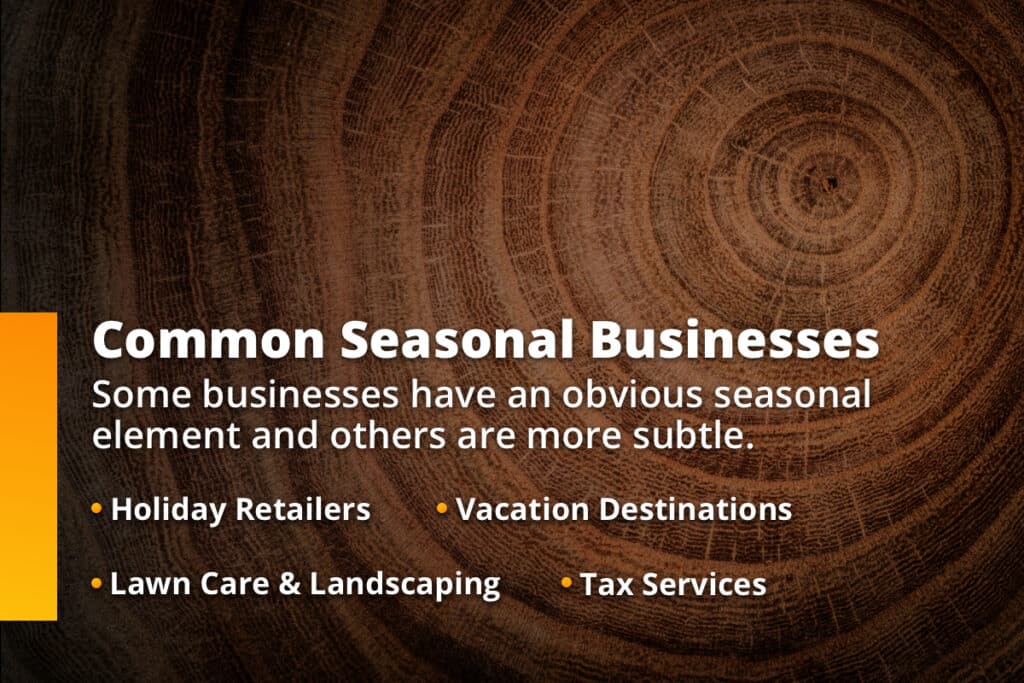
It can be frustrating to see the results from your website decline. Whether you are noticing a dip in traffic, a drop-off in sales, or both, no business owner wants to find those trends when looking at reports. Declines do happen; It’s a fact of doing business. However, it’s important to understand the ‘why’ behind what is happening so you can identify patterns in customer behavior.
When you are searching for reasons behind a website decline, it’s important to note that seasonality may be playing a role. If you are in a seasonal business, you might not have strong demand for your products or services throughout the entire year. Many industries have a busy season and a quiet season, and there isn’t much of anything that you’ll be able to do to change that fact. Rather than working against that reality, you can embrace it and use the seasonality to shape your strategies moving forward.
This article explains how you can identify seasonal patterns in your business and what adjustments you can make to really get the most out of that time. Seasonal industries can be just as profitable as those that are strong for all 12 months, but you need to approach your planning a bit differently to get the best possible results.
What Kinds of Businesses Are Seasonal?
Businesses can be seasonal for a variety of reasons. Some businesses have an obvious seasonal element, to the point where anyone would be able to determine that the business is likely to go up and down throughout the course of the year. Others are more subtle, however, and you may need to work in the space for a while before you start to understand the ebbs and flows of the business.

While we won’t be able to touch on every possible category of seasonal business in this article, the points below highlight a few examples:
- Holiday retailers. This might be the most obvious example of all. If you are in the business of selling goods related to the holidays, your business is sure to spike in October, November, and December, before immediately falling off in the aftermath. A website that represents this type of business is almost certainly going to see its highest traffic numbers in the weeks ahead of the holidays. Then, traffic after the holidays have ended could drop close to zero. Most seasonal businesses aren’t this extreme, so the swings tend to be more subtle in other industries.
- Vacation destinations. Another category that can deal with pretty dramatic seasonality is vacation spots and the businesses that serve them. In some cases, like beach locations, this will mean the busy season occurs when the weather is warm, and things quiet down in the winter. The opposite can be true, however, as is the case with ski resorts. For businesses in those areas, winter is the busy time, and the summer is a down period.
- Tax services. Again here, we see a strong seasonal bent to this industry, as much of the activity for tax businesses will happen in advance of important deadlines. With that said, there are various deadlines throughout the year beyond just the big one in April, so tax service companies don’t necessarily drop off quite as harshly as one might expect.
- Lawn care and landscaping. This one depends significantly on what climate is being served. In northern climates with cold winters, there isn’t much of a need for lawn care or landscaping services after October transitions into November. However, in warmer climates, lawn care is relevant all year round, and this industry is far less seasonal. It’s always important to take any local factors into consideration when determining how seasonal your market might be.
This list is just a partial accounting of the many different types of businesses that could be impacted by seasonality. Let’s move on to figure out how you can identify seasonal trends and use that information to inform your planning decisions.
Research Your Market
Without doing any research at all, you probably have a good idea of whether or not your market includes a seasonal component. In fact, if you have been in business for at least a year or two, you’ve already seen that seasonality for yourself and know it’s real. But what if you are just getting started? Planning your operations for the coming year could be difficult if you don’t know how busy you should expect to be.

Doing some quick research on the seasonal rise and fall of your industry is a great way to make smart choices. One handy tool for this kind of research is Google Trends. This is a website where you can enter search terms and receive a graph on how popular those terms are over set time periods. By zooming out on the graph and looking at the big picture, you should be able to get a good idea of how seasonal (or not) your market tends to be.
As an example of how this works, you can head to the Google Trends website and enter the term “Christmas gifts”. When you adjust the time period to the last five years, you’ll see huge spikes each year as December approaches, before the traffic immediately falls off after the holidays have ended. This is exactly what you would expect to see, of course, so it is a good proof of concept for how this tool works when examining a market.
Use Your Own Reporting
In addition to general market research, it’s also helpful to look at reporting from your own website to identify traffic trends. If you are just getting started, put tracking like Google Analytics in place right away so you can start to gather valuable data that will be useful down the road. And, if you’ve had a site for years, run some reports that go back a while to see how your traffic chart goes up and down with the months.
Making the Most of the Off-Season
It’s pretty easy to strategize for the busy period of a seasonal business. During this time, it’s going to be an “all hands on deck” mentality, as you’ll likely be working long hours and trying to capture every sale possible while the market is hot. This is the time of year when you make your money and grow your brand, so there is no holding back at this point.
Deciding how to approach the off-season can be a little trickier, however. How should you spend your time – and money – during this period? You don’t want to waste energy and ad dollars on campaigns that aren’t going to convert well, but at the same time, sitting around and doing nothing doesn’t seem like the right approach, either. Let’s look at a few ideas for how you might be able to make the most of the quiet season.
- Dive into content production. Most businesses that engage in digital marketing understand the value of producing a lot of content on a regular basis. Of course, content production takes time, and you probably don’t have time available during the busy season to make it happen. With that in mind, this is a great activity for the off-season. Create a schedule of posts and pages that you’d like to publish to your site and get to work on assembling that content while you have a little more time on your hands. This way, your content publishing doesn’t have to stop during the busy season, as the articles will already be written and they can simply be put out for the world to see on a predetermined schedule while you are working on other things.
- Clear out old inventory. For some businesses, the off-season is a good time to sell old inventory at a discount. Take a detailed look at what you have left from the last busy season and decide what you’d like to get rid of for a lower-than-retail price. Clearing out inventory in this way will not only bring in a bit of revenue, but it will also provide you with physical space to stock up as the next high season inches closer. You shouldn’t have to work too hard to make sales when offering a significant discount, even if you are selling during the off-season.
- Grow your list. The quiet time of year probably isn’t the right time to run ad campaigns that are focused on making sales. It’s going to be hard to close deals during this time, unless you are selling off inventory at a big discount as we mentioned above. However, you could run ad campaigns that are focused on building your email list rather than making sales. These types of ads are usually a little more affordable to run, and you could do yourself a big favor by stocking up your list ahead of the prime season. Explain to your potential leads how signing up for the email list now will make sure they are the first to know about new products and opportunities once the main season returns again.
- Do some digital housekeeping. You probably have some components of your online presence that could stand to be cleaned up a bit, and the down season is the right time to do that work. For instance, you could perform an SEO audit on your site to catch any on-page mistakes that can be fixed like missing meta descriptions, broken links, images without alt tags, and more. This kind of work is a little mundane, to be sure, but it can add up to create a nice boost in your SEO performance once people start searching for products and services in your industry once again.
Embracing Seasonality
There are some things to like about having a seasonal market, including the ability to take some downtime during the offseason to evaluate your business and update your plan for the coming year. Also, seasonal businesses make it easier for owners and managers to take breaks and vacations when things are slower. Of course, to make all of that work, you really need to take advantage of the busy season and book as much revenue as possible.
We hope this article has helped you understand why your results may be lagging during part of the year. Remember not to be so hard on yourself, but instead, embrace the quirks of your business and watch it thrive.
Most Popular Articles

Seeing Favicons in Your Google Search Results? Here’s Why…
Have you noticed anything different in your Google Search results lately? Google added tiny favicon icons to its organic search results in January. It was…

Business Growth and Digital Marketing News & Tips 4-14-24
Did you know? It’s five to twenty-five times more expensive to acquire a new customer than to retain an existing one. Increasing customer retention by…

Business Growth and Digital Marketing News & Tips 3-28-24
With the desire for precise measurement tools to determine ROI, there has been a rise in attention metrics. These metrics, which often utilize eye-tracking data,…








